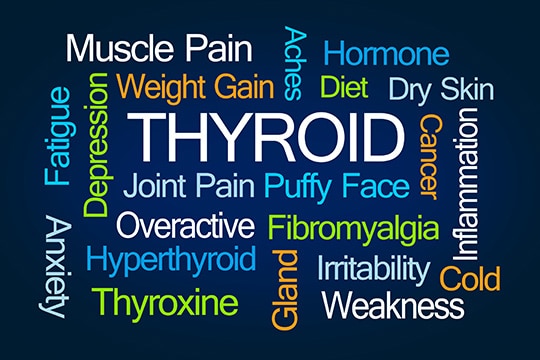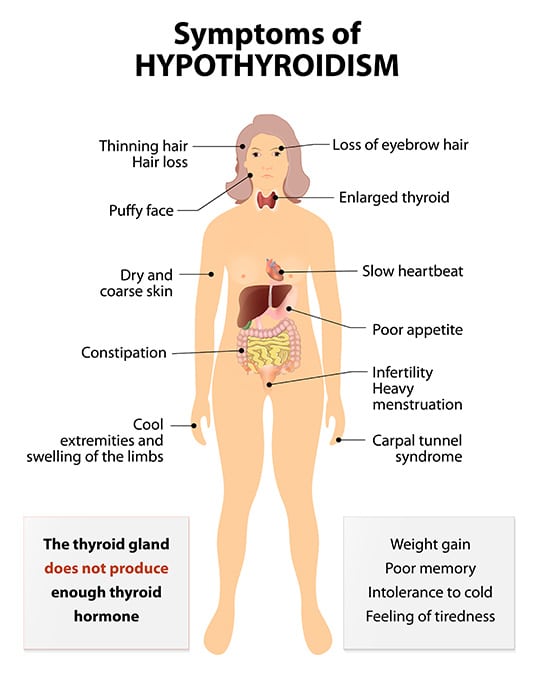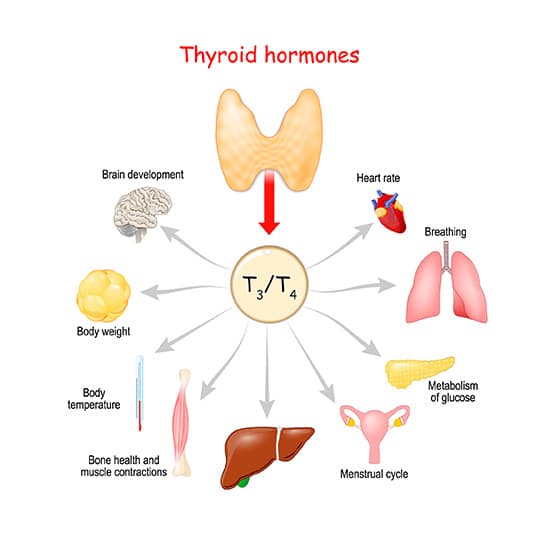What is it?
- The thyroid gland is a small, butterfly-shaped gland located in the neck just above the Adam’s apple. The thyroid gland is responsible for regulating the rate at which our bodies produce hormones like testosterone and estrogen. These hormones help control our body’s metabolism, growth, and temperature.
- Hypothyroidism occurs in the case of an underactive thyroid where the gland doesn’t produce enough hormones required for regulating the body systems, whereas hyperthyroidism is a result of overactive thyroid function. Hashimoto’s disease, thyroiditis and Graves’ disease are other diseases that are caused due to imbalanced thyroid hormone levels in the body.
- The Thyroid Diet can help you improve thyroid function, and manage your weight. Although the Thyroid Diet is very beneficial for those with hypothyroidism, you do not need to have thyroid disease to benefit from following a thyroid-friendly diet.
- Iodine and Selenium are two nutrients that are important for the thyroid diet. Iodine is essential to the making of thyroid hormone. Iodine deficiency is actually very common throughout the world, but is rarely seen in developed countries like the United States. Selenium helps your body use thyroid hormone once it is made.

How does the thyroid gland function? What is hypothyroidism?
The thyroid gland is responsible for producing hormones for the effective functioning of our body. When the thyroid hormone levels in the body fall, the pituitary gland sends a signal to the thyroid gland. This signal is called thyroid-stimulating hormone (TSH). On receiving the signal, thyroid hormones are released into the bloodstream.
However, in some cases even when the TSH levels are high, the thyroid glands do not release thyroid hormones. This condition is called primary hypothyroidism. In 90% of cases, primary hypothyroidism is caused by Hashimoto’s thyroiditis. It is an autoimmune disease in which the immune system mistakenly attacks the thyroid gland, restricting it from releasing the thyroid hormones. In other cases, suffering from iodine deficiency or having a genetic disorder or side effects of some medications can cause hypothyroidism.
Sometimes there is a problem with the pituitary gland and it does not send the required TSH to the thyroid gland, resulting in low levels of thyroid hormones being released. This is called secondary hypothyroidism.
Benefits of a Thyroid Diet
The thyroid diet can help you improve thyroid function and manage your weight. Although the thyroid diet is very beneficial for those with hypothyroidism, you do not need to have thyroid disease to benefit from following a thyroid-friendly diet.
Iodine and selenium are two nutrients that are important for the thyroid diet. Iodine is essential to making thyroid hormones. Iodine deficiency is very common throughout the world, but is rarely seen in developed countries like the United States. Selenium helps your body use thyroid hormone once it is made.
A healthy thyroid diet should include important nutrients like iodine, selenium, and zinc. You should avoid foods with goitrogens. Goitrogens are compounds that impact the normal functioning of the thyroid gland. Soy foods, cruciferous vegetables, millet, peanuts, sweet potatoes, peaches, etc. are high in goitrogens and should be avoided.
Weight Loss and Hormone Optimization With Thyroid Diet
WildBerryMD has helped a tremendous number of patients lose weight with diets designed for thyroid conditions. In addition, we offer detailed thyroid panel testing and assessment with our physician. We can help optimize your thyroid function with a natural thyroid prescription, an anti-inflammatory diet, meditation, stress management, and the right exercise for your lifestyle. The anti-inflammatory diet is designed to eliminate unwanted inflammation in a person’s body using a unique food-based approach. This healthy diet promotes healing your gut and reducing the harmful effects of autoimmune conditions. There are key factors in your food that can affect inflammatory response to your body, gut, and thyroid. These factors include the amounts and proportion of various fatty acids, the number of antioxidants, the food’s glycemic impact, or the effect of food on blood sugar levels. This diet is restrictive and mainly includes meats and vegetables with no processed foods. Our program will help you learn the foods you should eat and the foods to avoid. You will receive daily meal plans with recipes. Our thyroid diet will help you get started on your journey to a healthier you. Start today with detailed thyroid labs, assessment, treatment plan, and diet program at WildBerry MD for $299. Book your consult with our healthcare professionals today.

